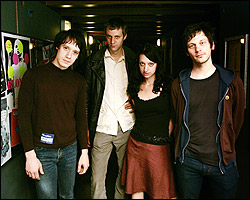THE DUTCH LEAVE their curtains open, so as you’re walking along the canal-lined cobblestone streets at dusk, you can see inside their brightly lit homes and watch couples cooking dinner together, kids doing their homework. It’s a sign of their modesty, an everyday admittance that they have nothing to hide. In Bali, men are physically affectionate with each other—openly. Male friends sit close together on street corners and in restaurants, often with their arms around each other or hand over hand. You can probably read about these things in the in-flight magazine on your way to Topeka, but it’s impossible to truly experience other ways of life even in the best books and magazines. You can’t comprehend the complexities and simplicities of culture until you’ve been immersed in more than one. You can’t understand the ways in which the world is both big and small until you allow yourself to be humbled by your place in it, until you leave your country and live in someone else’s—even if it’s just for 10 days.
The travel professionals at Edmonds-based Treasures of Turkey want you to experience the culture of cities like Istanbul, Cappadocia, and Ankara. You can visit remains of the ancient Roman Empire, eat some of the most delicious and healthy food in the world, enjoy beautiful beaches—and, according to the representative I spoke to at the recent annual Seattle Travel Show at the Seattle Center Exhibition Hall, you’ll be shown kindness and generosity by the Turkish people. The Turkish people “love Americans,” she says. The State Department, however, would have you believe otherwise. As of Nov. 20, it has advised that Americans “defer nonessential travel to Turkey” because of “potential for violence and terrorist actions against U.S. citizens.”
International travel certainly requires more forethought than it did pre-9/11—and, for that matter, pre-dot-com crash. S.P. Singh, director of Incredible India, also had a booth at the travel show, and when he, too, expressed to me that his people love Americans, I had no trouble believing him. Many of the 800 numbers owned by American companies are now answered by personnel in cities like Bangalore, and analysts at Morgan Stanley recently estimated that as many as 2 million white-collar jobs will be exported to low-cost countries like India and China in the next 10 years. What’s not to love? But what about Syria, Lebanon, Morocco? Rita Zawaideh of Caravan-Serai Inc. wants to take you within five hours of Baghdad on the Damascus Road as she personally escorts you through Northern Africa and the Middle East. Do they love Americans there? Zawaideh, quite enthusiastically, says yes. She says many people smartly inquire as to whether or not her tours are safe, and her quick, smiling, and somewhat cavalier reply is that she wouldn’t be putting herself at risk by taking people there if they weren’t.
WHILE THE TRAVEL show was, predictably, populated by agents who want to get you to benign resorts in Maui, Montana bear country, and Mickey Mouse destinations, Zawaideh and the Treasures of Turkey representative that I spoke to are asking you to take something of a risk. They’re not suggesting that you travel uninformed, and their literature suggests a large dose of history and education throughout the tours. Still, a trip to the Middle East presents an element of danger far beyond that of a trip to Hawaii. Sure, it’s possible that you might be gunned down on an Ohio highway or carjacked in any seedy neighborhood in the country, but frequent bombings in the West Bank are a somewhat more imposing threat. And considering the terrorist bombing in October 2002 that killed at least 200 tourists in Kuta, Bali’s vacation epicenter, even a place as seemingly serene as Bali isn’t necessarily safe. Like Turkey and most countries in the Middle East, Bali, the rest of Indonesia, and the Philippines and Thailand have significant Muslim populations. Those countries have large Christian and Catholic populations, too. In fact, I have a friend whose parents went to Turkey last year—without incident—to visit various biblical sites. Do the Muslims in Bali love the Christians in the Philippines like the Arabs love Americans? Do they want to experience each other’s cultures and enjoy each other’s cuisine? Do they know the words to “It’s a Small World After All”?
I WANT TO BELIEVE that the average world citizen is like me: curious, open, and able to separate government from the governed. And, certainly, Europeans and Asians have generations of experience differentiating between a country’s tyrannical government and its rather helpless population. On a recent trip through Germany and Holland, I experienced enormous generosity and kindness by the people there, but the first picture I took in Berlin was of graffiti on the top of a tall, windowless building. The writing said, “FUCK USA AND GB.”
Do they love Americans there? I suppose it depends on whom you talk to.








